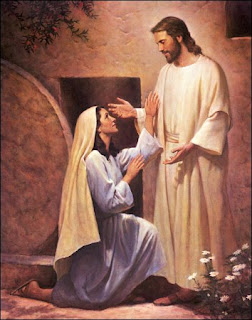(Jer 26:1-9; Mt
13:54-58)
It is always difficult to do the
right things. We easily follow the wrong crowd or spend much time on things
that do not really matter. Have you noticed that sometimes the real people that
matter in our lives receive less attention! We all want good things and we hate
liars, but why does truth hurt? It is difficult to follow ‘crowd life’ or ‘trending
ideas’ without abiding in falsehood. In the readings of today, both Jeremiah
and Jesus were rejected by their people respectively.
The Lord sent Jeremiah to the Temple on the Sabbath to address the people as they gathered to worship. He warned them of the looming danger if they refused to repent. “Thus says the Lord: if you will not listen to me, to walk in my law...and to heed the words of my servants the prophets whom I send to you urgently...then I will make this house like Shiloh...” Hearing this, instead of repenting of their evil ways, they got angry at Jeremiah. His words became an arrow that pierced their hearts. The priests, the fake prophets, and all the people gathered around Jeremiah and held him, saying, “You shall die!”
In the same vein, Jesus came to His home town and taught in the synagogue. His message touched them. They were surprised, and said, “Where did this man get this wisdom and these mighty works? Is not this the Carpenter’s son? Is not his mother called Mary?” They took offense at Him, and refused to accept Him. But Jesus answered that a prophet is not without honour except in his own country and in his own house. And he could not perform any miracles there because of their unbelief.
Truth hurts when we have settled for falsehood and accepted it as ‘truth.’ Then, the presence of truth begins to appear like falsehood. In the case of Jeremiah, the people were engrossed in the ‘peace’ they enjoyed while disregarding God’s law. They took pride in the beautiful temple, while their personal lives were abomination unto the Lord. But Jesus was rejected because His people held tight to their pre-conceived knowledge of Him, and they refused to be open to a new discovery about Him. ‘Truth’ displaces our ‘centre of pride’, uprooting it from our self-pleasure or ‘personal convenience’ to the righteousness of Jesus Christ, who is Truth Himself (Jn 14:6). Secondly, truth is ‘ever new.’ It brings newness to the heart. Truth hurts in a heart that is hardened; a heart that is not open to the fresh outpouring of the Holy Spirit.
Imagine the danger the Israelites faced by rejecting Jeremiah, and the divine blessings the Jews missed by not accepting Jesus. These are the cost of falsehood. Jesus has come to make His ‘home’ in our hearts. He comes, loaded with blessings. Let us not reject Him by holding to our old ideas or be blindfolded by self-centred lives. The word of God sets us apart from the crowd. We pray today that God will open our ears to hear the truth, and the courage to accept it. May He remove all falsehood from our ways. Amen.
Saints Peter & Paul Catholic
Church,
Tedi-Muwo, Lagos.
Friday July 31st, 2020.
Memorial of St Ignatius of Loyola.


